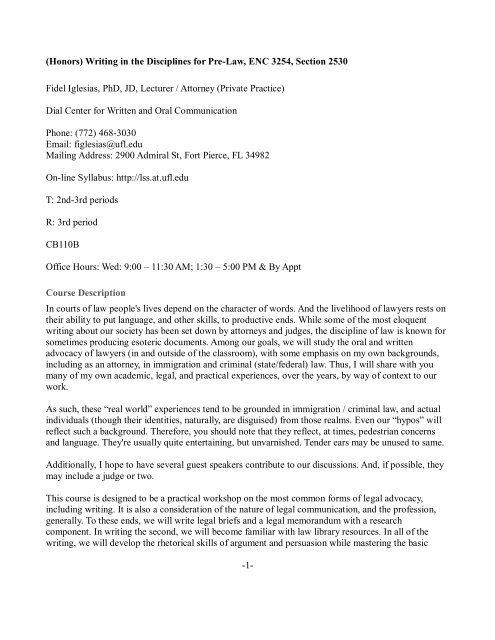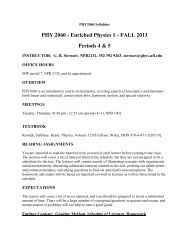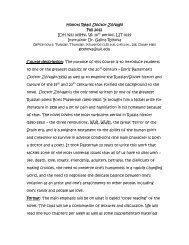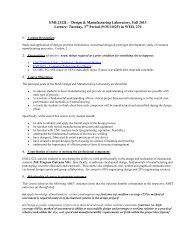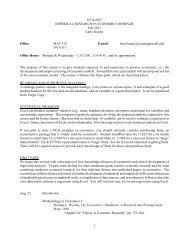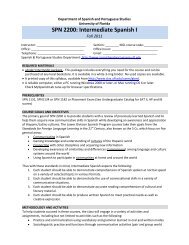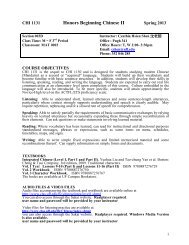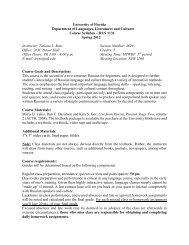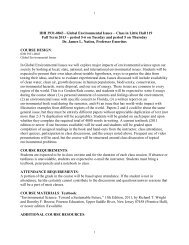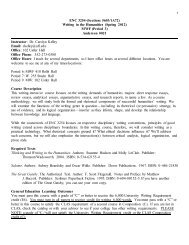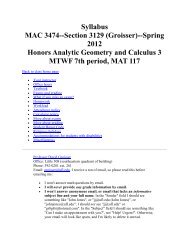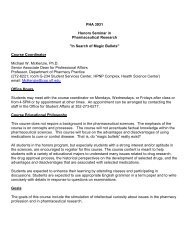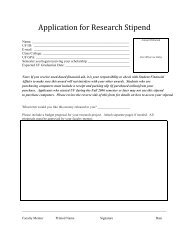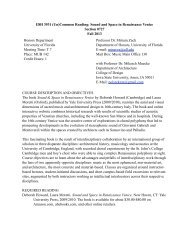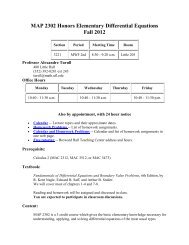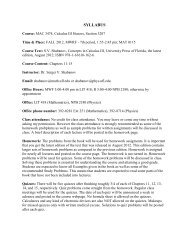ENC3254 HNR Writing for Prelaw Iglesias - University of Florida ...
ENC3254 HNR Writing for Prelaw Iglesias - University of Florida ...
ENC3254 HNR Writing for Prelaw Iglesias - University of Florida ...
You also want an ePaper? Increase the reach of your titles
YUMPU automatically turns print PDFs into web optimized ePapers that Google loves.
(Honors) <strong>Writing</strong> in the Disciplines <strong>for</strong> Pre-Law, ENC 3254, Section 2530<br />
Fidel <strong>Iglesias</strong>, PhD, JD, Lecturer / Attorney (Private Practice)<br />
Dial Center <strong>for</strong> Written and Oral Communication<br />
Phone: (772) 468-3030<br />
Email: figlesias@ufl.edu<br />
Mailing Address: 2900 Admiral St, Fort Pierce, FL 34982<br />
On-line Syllabus: http://lss.at.ufl.edu<br />
T: 2nd-3rd periods<br />
R: 3rd period<br />
CB110B<br />
Office Hours: Wed: 9:00 – 11:30 AM; 1:30 – 5:00 PM & By Appt<br />
Course Description<br />
In courts <strong>of</strong> law people's lives depend on the character <strong>of</strong> words. And the livelihood <strong>of</strong> lawyers rests on<br />
their ability to put language, and other skills, to productive ends. While some <strong>of</strong> the most eloquent<br />
writing about our society has been set down by attorneys and judges, the discipline <strong>of</strong> law is known <strong>for</strong><br />
sometimes producing esoteric documents. Among our goals, we will study the oral and written<br />
advocacy <strong>of</strong> lawyers (in and outside <strong>of</strong> the classroom), with some emphasis on my own backgrounds,<br />
including as an attorney, in immigration and criminal (state/federal) law. Thus, I will share with you<br />
many <strong>of</strong> my own academic, legal, and practical experiences, over the years, by way <strong>of</strong> context to our<br />
work.<br />
As such, these “real world” experiences tend to be grounded in immigration / criminal law, and actual<br />
individuals (though their identities, naturally, are disguised) from those realms. Even our “hypos” will<br />
reflect such a background. There<strong>for</strong>e, you should note that they reflect, at times, pedestrian concerns<br />
and language. They're usually quite entertaining, but unvarnished. Tender ears may be unused to same.<br />
Additionally, I hope to have several guest speakers contribute to our discussions. And, if possible, they<br />
may include a judge or two.<br />
This course is designed to be a practical workshop on the most common <strong>for</strong>ms <strong>of</strong> legal advocacy,<br />
including writing. It is also a consideration <strong>of</strong> the nature <strong>of</strong> legal communication, and the pr<strong>of</strong>ession,<br />
generally. To these ends, we will write legal briefs and a legal memorandum with a research<br />
component. In writing the second, we will become familiar with law library resources. In all <strong>of</strong> the<br />
writing, we will develop the rhetorical skills <strong>of</strong> argument and persuasion while mastering the basic<br />
-1-
elements <strong>of</strong> style. At the end <strong>of</strong> the term, you will participate in a required moot court competition (<strong>for</strong><br />
the class) that will also emphasize your verbal advocacy. Several field trips, including to a federal and<br />
state court in your area, and one to a law library in your vicinity, and perhaps the local jail there, will<br />
expose you to the real-world environments in which many counselors work. The persons conducting<br />
them, <strong>for</strong> us, are very busy. You are expected to be there, on time, and alert and courteous.<br />
While this will be a course on campus, it is important <strong>for</strong> you to realize that you will be working in<br />
"virtual time," at times, regarding class discussions, presentations, and written work; that this course<br />
requires extensive writing and, relatively speaking, reasonable online time; and that we may actually<br />
coordinate several online webcam classes (and individual sessions) via Sakai and other similar<br />
technologies. In sum, this course may be an interactive one -- on campus (as per <strong>of</strong>ficial schedule) and<br />
online (TBA), mostly via Sakai.<br />
Optimally, you will thus need to have access to a PC; online capabilities; a printer; webcam<br />
s<strong>of</strong>tware/hardware; word processing and power point programs; a telephone; possible access to a fax<br />
machine; and the ability to operate them.<br />
You should remember that, while I will religiously maintain your student and related in<strong>for</strong>mation<br />
confidential, under applicable law, that all online communications are liable to unauthorized<br />
publication by others; via your own mistakes; technological mishaps; and even criminal activity. Thus,<br />
you should be very careful about your online communications -- keep them relevant to the course; do<br />
not communicate anything you wish to maintain private; and do not violate any rules, laws, etc when<br />
participating in this course. I will not be responsible <strong>for</strong> same. And I will not allow inappropriate<br />
conduct, in class, or online, <strong>for</strong> this course.<br />
Course Requirements and Policies<br />
Assignments and Course Work<br />
To pass <strong>Writing</strong> in the Disciplines <strong>for</strong> Pre-Law, you must complete all required course work.<br />
You will write and revise communications <strong>of</strong> at least five types: legal briefs, legal memorandum,<br />
letters, personal statements, and résumés. Regular in-class work, in small teams, will contribute to your<br />
grade.<br />
Class participation is also a significant part <strong>of</strong> this course. It includes in-class work, homework, a<br />
journal <strong>of</strong> legal briefs, and attendance in class and at special events, including the moot competition at<br />
the end <strong>of</strong> the term. You must take these into account regarding your overall schedule. (See attendance<br />
policy below.)<br />
In-class work must be completed in class on the day assigned and may not be made up. Out-<strong>of</strong>-class<br />
work must be typed in the appropriate pr<strong>of</strong>essional <strong>for</strong>mat. It is due at the beginning <strong>of</strong> class and will<br />
not be accepted late.<br />
"In-class" refers to our scheduled campus and online interactions (chats, class time, presentations, and<br />
other assignments that we, as a class, meet simultaneously online to work on), which will be our<br />
equivalents to "real time" class meetings on campus.<br />
-2-
Attendance and Preparation <strong>for</strong> Class<br />
Readings should be completed by the date on which they are scheduled, unless otherwise indicated.<br />
Even if you have an excused absence, you should make every attempt to turn assignments in on time.<br />
We have a strict attendance policy: <strong>for</strong> every absence over three, 50 points, or half a letter grade (from<br />
the overall course grade), will be deducted from your final grade. An "absence" is defined as either<br />
your non-attendance, online, <strong>for</strong> our scheduled interactions (eg, class discussions, lectures,<br />
presentations, chats) or, even if you are, technically, in class or online, you are not regularly engaged in<br />
our work as judged by the instructor. For example, I will be asking, each <strong>of</strong> you, to individually<br />
respond during our meetings in class and online. If you do not respond, after a reasonable amount <strong>of</strong><br />
time (ie, several minutes), I will mark you down as absent given you may be away from the screen;<br />
elsewhere; and, if in class, distracted or simply unprepared. If a serious, <strong>of</strong>ficial, and/or technical<br />
problem, beyond your control, and which you can document, accounts <strong>for</strong> same, then that may be an<br />
excused absence as per my discretion. (See attendance policy below.)<br />
Academic Honesty<br />
Plagiarism is a serious violation <strong>of</strong> the Student Honor Code. The Honor Code prohibits and defines<br />
plagiarism as follows:<br />
Plagiarism. A student shall not represent as the student’s own work all or any portion <strong>of</strong> the work <strong>of</strong><br />
another. Plagiarism includes (but is not limited to):<br />
a. Quoting oral or written materials, whether published or unpublished, without proper attribution.<br />
b. Submitting a document or assignment which in whole or in part is identical or substantially identical<br />
to a document or assignment not authored by the student. (<strong>University</strong> <strong>of</strong> <strong>Florida</strong>, Student Honor Code,<br />
15 Aug. 2007.)<br />
<strong>University</strong> <strong>of</strong> <strong>Florida</strong> students are responsible <strong>for</strong> reading, understanding, and abiding by the entire<br />
Student Honor Code which, along with other academic, faculty, and student catologs, handbooks,<br />
in<strong>for</strong>mation, and policies may be found at these sites:<br />
http://www.registrar.ufl.edu/academicinfohub.html and http://www.aa.ufl.edu/handbook.<br />
Their contents are incorporated herein by reference. Important Tip: You should never copy and paste<br />
something from the Internet without providing the exact location from which it came.<br />
I especially urge you not to engage in real-time or online dishonesty and related violations. The<br />
medium <strong>of</strong> communication may vary, with differing permutations in different venues, but they are<br />
prohibited nonetheless. We'll discuss this issue further during the term.<br />
Grading<br />
The evaluation <strong>of</strong> written work will be thorough and rigorous, holding students to the highest<br />
pr<strong>of</strong>essional standards. We will use a 1000-point system, the points distributed as follows:<br />
100 Legal Brief 1 (Exercise)<br />
200 Legal Brief 2 (Negligence or Emotional Distress Case)<br />
300 Memorandum<br />
-3-
100 Legal Brief 3 (Tournament Round 1)<br />
100 Application Materials<br />
10 Annotated Bibliography<br />
10 Case Flow Chart<br />
25 Journal Assignment<br />
55 Clinical Work<br />
100 Class Participation: In-Class Work, Homework; Field Trip<br />
Regarding the clinical work, it will either focus on, or may involve both, immigration and/or criminal<br />
law. Specifically, you will get to work on a “real case” in some capacity. I envision this involving<br />
assisting an inmate, at the Alachua County Jail, to some extent, on a pro bono basis, regarding the<br />
defendant's case. If same has immigration issues, so much the better. We might assist her/him on one or<br />
the other aspects <strong>of</strong> such cases (many times, criminal and immigration law intersect, thus this<br />
possibility). Of course, we would have to execute confidentiality agreements/waivers; releases, if<br />
applicable, <strong>for</strong> the <strong>University</strong>; and get criminal counsel (if one is already appointed), and the Jail's<br />
administration, on board. So much to do, and may not be able to pull it <strong>of</strong>f. But worth an attempt<br />
methinks. This is a small class, so it would likely lend itself nicely here.<br />
Grading is, by definition, a somewhat subjective process. In my case, it is based on years <strong>of</strong> experience<br />
with these types <strong>of</strong> assignments; with students from varied backgrounds; in different fields; and at<br />
different institutions. Nonetheless, it remains an “art” or “trade,” <strong>of</strong> sorts, and cannot simply be reduced<br />
to a matter <strong>of</strong> rubrics, totaling raw points, and so on.<br />
Grading Scale<br />
A 4.0<br />
93-<br />
100<br />
930-<br />
1000<br />
C 2.0 73-76<br />
730-<br />
769<br />
A- 3.67 90-92<br />
900-<br />
929<br />
C- 1.67 70-72<br />
700-<br />
729<br />
B+ 3.33 87-89<br />
870-<br />
899<br />
D+ 1.33 67-69<br />
670-<br />
699<br />
B 3.0 83-86<br />
830-<br />
869<br />
D 1.0 63-66<br />
630-<br />
669<br />
B- 2.67 80-82<br />
800-<br />
829<br />
D- 0.67 60-62<br />
600-<br />
629<br />
C+ 2.33 77-79<br />
770-<br />
799<br />
E 0.00 0-59 0-599
A note on this point system, and "rubrics" generally. They are aids to learning in my opinion. Receiving<br />
points, <strong>for</strong> the assignments, along the way, should not be viewed as simple accounting where you,<br />
literally, add things up and, VOILA, there's your final grade. For instance, I will simply not have any<br />
idea where you stand in terms <strong>of</strong> participation until the course is nearing the end given this is an<br />
ongoing portion <strong>of</strong> your per<strong>for</strong>mance. The moot court competition, additionally, will occur, again,<br />
toward the end <strong>of</strong> the term. Thus, I cannot evaluate that until the very end. And, when totaling points, at<br />
the end, I do not only consider your overall improvement (or lack there<strong>of</strong>) over time, but then place<br />
your individual per<strong>for</strong>mance in the context <strong>of</strong> your colleagues' as well. In other words, I evaluate your<br />
work individually and comparatively.<br />
To make an "A" in this course, you must earn an "A" on at least two <strong>of</strong> the four major writing<br />
assignments (brief 1, 2, or 3 or the memorandum).<br />
Extra credit (up to 5% <strong>of</strong> the course total) may be given, at the instructor's discretion, <strong>for</strong> our upcoming<br />
field trip(s) AND attendance (as defined herein) at other designated activities.<br />
Attendance is, <strong>of</strong> course, required, includes required field trips, and affects the participation grade<br />
because in-class, field work and homework cannot be made up. Every absence over three lowers your<br />
final course average by 50 points or one half <strong>of</strong> a letter-grade. This penalty is in addition to any<br />
lowering <strong>of</strong> your grade because you are unprepared.<br />
Only documented emergencies, involving you or your immediate family, or <strong>of</strong>ficial <strong>University</strong><br />
functions, may excuse you, at the instructor's discretion, from certain attendance, participation, field<br />
trip, and due date requirements. If a requirement is excused, alternative assignments may be given at<br />
the instructor's discretion.<br />
Required Text<br />
<strong>Writing</strong> in Law. From Laurence Behrens and Leonard Rosen, <strong>Writing</strong> and Reading Across the<br />
Curriculum. New York: Longman, 2005.<br />
Additional select readings may be occasionally assigned. They will likely be available online or via<br />
reserve readings at Library.<br />
You are expected to read, understand, and otherwise be prepared to discuss this reader every class<br />
period.<br />
Schedule <strong>of</strong> Class Assignments<br />
Unit 1: The Form <strong>of</strong> Legal Argument<br />
Week 1:<br />
Introductions: syllabus, texts, in<strong>for</strong>mation sheets. Discuss the elements <strong>of</strong> an effective legal writing<br />
style. Discuss the introduction to the course materials (<strong>Writing</strong> in Law 733 & 763)--the following case<br />
-5-
is optional reading. Discuss common vs. civil law. Discuss "The American Legal System" (WL 742).<br />
Week 2:<br />
A <strong>for</strong>m <strong>for</strong> legal research reports. Discuss "IRAC: How to Write about Legal Cases” (WL 752). Discuss<br />
a "legal brief" concerning an everyday situation.<br />
Legal Brief 1 (Exercise) Concerning an Everyday Situation. Discuss Cases (WL 760-768, 798-804).<br />
Unit 2: Putting the Legal Brief into Practice<br />
Week 3:<br />
In Class: Write a paragraph summarizing the applicable rules in your case, and outline your analysis.<br />
Debates Preparation: In class: Outline the application section, organize your team <strong>for</strong> the debate.<br />
Homework: Draft the application. (WL 769 & 777)<br />
Week 4:<br />
Discuss debates. Review and synthesize the application. Discuss legal brief 2. (WL 798)<br />
Week 5:<br />
Discuss debates and legal brief 2. Discuss journal assignment and writing a legal memorandum.<br />
Discussion <strong>of</strong> issue statements, primary research sources, and the process <strong>of</strong> legal research. (WL 805)<br />
Unit 3: Legal Research and <strong>Writing</strong><br />
Week 6:<br />
Issue statement Research materials orientation. Memo <strong>for</strong>mat.<br />
Law library Orientation w/ guest speaker – TBA.<br />
Discuss secondary research materials and citation <strong>for</strong>mat. Homework: Discuss annotated bibliography.<br />
(WL 815)<br />
Week 7:<br />
Continue law library work. Annotated bibliography continued, including background research sources.<br />
Discuss issue statement and facts.<br />
Discuss revised issue statement and facts. Application <strong>of</strong> the law or analysis: General principles and<br />
description <strong>of</strong> rules.<br />
(WL 825)<br />
Week 8:<br />
Application <strong>of</strong> the law or analysis: Examples and workshop.<br />
Application <strong>of</strong> the law or analysis: Using case precedents and arguing by analogy. Use <strong>of</strong> citations.<br />
-6-
Week 9:<br />
Workshop: Bring to class source materials <strong>for</strong> memorandum. Conclusions and recommendations--<br />
General principles. Discuss application <strong>of</strong> the law <strong>for</strong> peer review. Discuss law school applications at<br />
next meeting.<br />
Unit 4: Law School Applications<br />
Week 10:<br />
Revised memorandum examined. Discuss law school applications. <strong>Writing</strong> the résumé <strong>for</strong> graduate<br />
school. Bring your résumé to class, if you have one. <strong>Writing</strong> a personal statement.<br />
Week 11:<br />
Résumé and personal statement <strong>for</strong> peer review.<br />
Revised résumé and personal statement. New legal issue and discussion.<br />
The principles <strong>of</strong> debate--guest speaker.<br />
Unit 5: Winning Legal Debates / Misc Topics<br />
Weeks 12-16:<br />
Focus on clinical case(s) work.<br />
Discuss legal brief 3.<br />
Conclude any remaining written work.<br />
Finals Week: As per Registrar's schedule. Due: Final Legal Brief #3.<br />
The above schedule <strong>of</strong> assignments, readings, and events is tentative. I reserve the right to change it as<br />
needed. I will announce (in class and via email / Sakai) our assignment specifics and dates as the term<br />
progresses. You are responsible <strong>for</strong> being in class when they are announced, and <strong>for</strong> signing up <strong>for</strong><br />
Sakai. You are responsible <strong>for</strong> reading your emails.<br />
The weekly schedule is our general framework. We will aim to follow it, but not fanatically. Units may<br />
overlap, and the schedule adjusted accordingly. And the number <strong>of</strong> actual weeks may vary by term.<br />
Thus, the readings (text) schedule is tentative. It will likely takes us more time, than referenced above,<br />
to finish the book. Nonetheless, we will finish it early. So, early on, think <strong>of</strong> topics you may be<br />
interested in. And I will assign, during the term, assorted online readings.<br />
-7-
Tests<br />
There will be much hands-on work in this course. There<strong>for</strong>e, I do not intend to give you many <strong>for</strong>mal<br />
examinations. However, this is premised on your doing the required assignments and otherwise being<br />
prepared in class. Otherwise, or if another educational reason calls <strong>for</strong> it, I may nevertheless give you<br />
an exam, quiz, so <strong>for</strong>th, if need be. It/they would be under the “homework” points category (see above).<br />
Educational Philosophy<br />
My main goal, in this course, is <strong>for</strong> all <strong>of</strong> us to learn. To that end, it will be essential that all <strong>of</strong> us<br />
attend; show up prepared; and contribute to our discussions.<br />
Along those lines, grades are simply one tool <strong>for</strong> encouraging / recognizing learning. While numbers<br />
will be assigned to individual assignments (and the overall course grade), it is important to realize that<br />
this is not a science. In other words, verbal and written work is, by its nature, subjective—<strong>for</strong> you when<br />
speaking and writing, and <strong>for</strong> me in assessing it. There are some grammatical and stylistic (and <strong>for</strong> the<br />
law, legal) guideposts <strong>for</strong> same. But, as they say when it comes to beauty, it is <strong>of</strong>ten “in the eyes <strong>of</strong> the<br />
beholder.”<br />
Thus, my main criterion <strong>for</strong> judging your work, verbal and written, include ef<strong>for</strong>t (as evidenced in your<br />
assignments), improvement over time, the “quality” <strong>of</strong> your advocacy skills (oral and on paper), and<br />
how your colleagues per<strong>for</strong>m in their own ef<strong>for</strong>ts. In other words, I will determine whether you met the<br />
minimum requirements <strong>for</strong> an assignment; judge your work, individually, over time (to see if your<br />
ef<strong>for</strong>t level and the quality <strong>of</strong> your work has evolved during the term); and then comparatively in terms<br />
<strong>of</strong> your colleagues. You should not expect to, simply, and automatically, "plug in" your specific<br />
assignment scores into a "rubric" and expect that same final course grade. Besides several assignments<br />
not being graded until the end <strong>of</strong> the term, when all work is finally completed, there are other<br />
considerations such as those previously mentioned. Assignment scores are, to some extent, guideposts<br />
<strong>for</strong> you to judge your work by, as well as learning tools.<br />
I usually round upward, on final grades, to take these considerations into account.<br />
You should take advantage <strong>of</strong> extra credit options.<br />
I would encourage you to see me to discuss your per<strong>for</strong>mance, and standing in class, individually. We<br />
can meet after/be<strong>for</strong>e class and/or my <strong>of</strong>fice. Just let me know be<strong>for</strong>ehand. Do not wait until the last<br />
minute to do this. It is your responsibility to meet with me, individually, to discuss your progress in the<br />
course. Sakai, <strong>for</strong> instance, is only a tool <strong>for</strong> our use, and does not supplant a real meeting with an<br />
instructor.<br />
Do show initiative in class; during our conferences; via online / personal interaction with me and your<br />
colleagues; and otherwise be proactive regarding the course. I will not "spoon feed" you.<br />
Students With Disabilities<br />
The <strong>University</strong> <strong>of</strong> <strong>Florida</strong> complies with the Americans with Disabilities Act. Students requesting<br />
accommodation should contact the Students with Disabilities Office, Peabody 202. That <strong>of</strong>fice will<br />
provide documentation to the student whom must then provide this documentation to the instructor<br />
when requesting accommodation.
Additionally, students must provide the above-referenced documentation, to the instructor, be<strong>for</strong>e the<br />
end <strong>of</strong> the second week <strong>of</strong> class unless the disability arose, and is documented as so arising thereafter,<br />
<strong>for</strong> reasons beyond the control <strong>of</strong> the student. Lastly, the student must, also, email the instructor, be<strong>for</strong>e<br />
the end <strong>of</strong> the second week <strong>of</strong> class, a detailed list <strong>of</strong> requested accommodations. Unless the student<br />
complies with these instructor requirements, he/she will not be deemed in compliance with the ADA.<br />
Religious Accommodations<br />
Any religious accommodations, requested by students, must be conveyed, via UF email, to the<br />
instructor by the end <strong>of</strong> the second week <strong>of</strong> class. Otherwise, none will be deemed necessary.<br />
Holidays / Misc.<br />
Labor Day: 09/02; Homecoming: 11/8 – 9; Vet Day: 11/11; Thanksgiving: 11/27-30<br />
Please Note: Since I'm an attorney, I may have to attend one or two hearings during term. I would<br />
advise, obviously, be<strong>for</strong>ehand. No legal advice given, and no students assisted legally.<br />
Assessment Rubric (For Written Work – Only A Guide)<br />
CONTENT<br />
ORGANIZATION<br />
AND<br />
COHERENCE<br />
ARGUMENT AND<br />
SUPPORT<br />
STYLE<br />
MECHANICS<br />
SATISFACTORY (Y)<br />
Papers exhibit evidence <strong>of</strong> ideas that<br />
respond to the topic with complexity,<br />
critically evaluating and synthesizing<br />
sources, and provide an adequate<br />
discussion with basic understanding <strong>of</strong><br />
sources.<br />
Documents and paragraphs<br />
exhibit identifiable structure <strong>for</strong> topics,<br />
including a clear thesis statement and<br />
topic sentences.<br />
UNSATISFACTORY (N)<br />
Papers either include a central<br />
idea(s) that is unclear or <strong>of</strong>f- topic or<br />
provide only minimal or inadequate<br />
discussion <strong>of</strong> ideas. Papers may<br />
also lack sufficient or appropriate<br />
sources.<br />
Documents and paragraphs lack<br />
clearly identifiable organization,<br />
may lack any coherent sense <strong>of</strong><br />
logic in associating and organizing<br />
ideas, and may also lack transitions<br />
and coherence to guide the reader.<br />
Documents use persuasive and<br />
confident presentation <strong>of</strong> ideas,<br />
Documents make only weak<br />
strongly supported with evidence. At<br />
generalizations, providing little or no<br />
the weak end <strong>of</strong> the satisfactory range,<br />
support, as in summaries or<br />
documents may provide only<br />
narratives that fail to provide critical<br />
generalized discussion <strong>of</strong> ideas or may<br />
analysis.<br />
provide adequate discussion but rely on<br />
weak support <strong>for</strong> arguments.<br />
Documents use a writing style with<br />
word choice appropriate to the context,<br />
genre, and discipline. Sentences<br />
should display complexity and<br />
logical structure.<br />
Papers will feature correct or error-free<br />
presentation <strong>of</strong> ideas. At the weak end<br />
Documents rely on word usage that<br />
is inappropriate <strong>for</strong> the context,<br />
genre, or discipline. Sentences may<br />
be overly long or short with<br />
awkward construction. Documents<br />
may also use words incorrectly.<br />
Papers contain so many mechanical<br />
or grammatical errors that they
<strong>of</strong> the satisfactory range, papers may<br />
contain a few spelling, punctuation, or<br />
grammatical errors that remain<br />
unobtrusive and do not obscure the<br />
paper’s argument or points.<br />
impede the reader’s understanding<br />
or severely undermine the writer’s<br />
credibility.<br />
-10-


